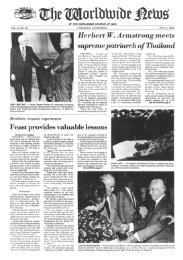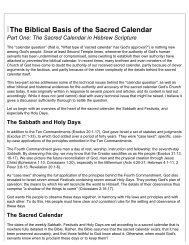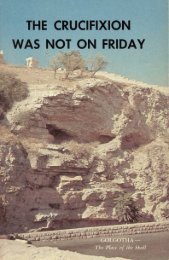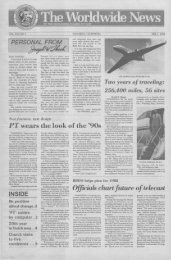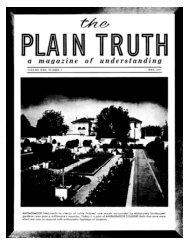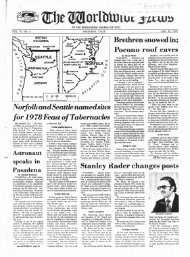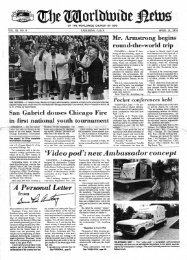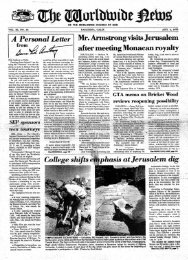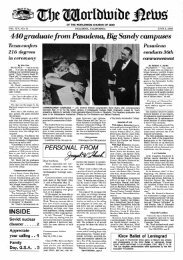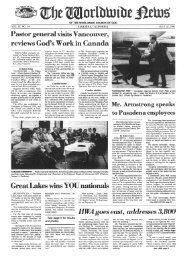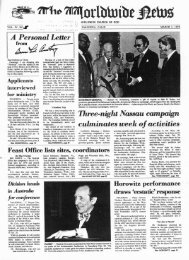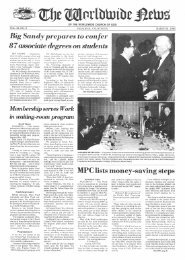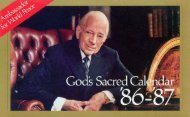PT Jan-67 - Herbert W. Armstrong Library and Archives
PT Jan-67 - Herbert W. Armstrong Library and Archives
PT Jan-67 - Herbert W. Armstrong Library and Archives
Create successful ePaper yourself
Turn your PDF publications into a flip-book with our unique Google optimized e-Paper software.
38 Tbe PLAIN TRUTH<br />
<strong>Jan</strong>uary, 19<strong>67</strong><br />
the remains should be buried with appropriate honors in Abner's tomb in<br />
H ebron. These acts made it plain to the Israelites that David had a strict regard<br />
fo r justice, a fact that created great respect for him. (II Samuel 4: 9- 12. )<br />
King of ALL Israel<br />
By this time David had been the leader of Judah for more than seven years.<br />
(II Samuel 2:11.) Over the years leaders in the various tribes had been turning to<br />
David <strong>and</strong> leading many thous<strong>and</strong>s into allegiance to him. (I Chronicles 12: 1-22;<br />
II Samuel 3: 1.) After Ish-bosheth was murdered, the elders of all Israel asseinbled<br />
at Hebron with over a third of a million me_~". They reminded' David that because all<br />
the people of Israel were of the same family, <strong>and</strong> because Davi? had been a wise <strong>and</strong><br />
fair leader in the past <strong>and</strong> the chief under Saul, they wanted to acknowledge him king<br />
over all Israel. (II Samuel 5: 1-3; I Chronicles 12: 22-40.)<br />
Thus God caused matters to come about in such a manner, over the years, that<br />
David was at last anointed king of all the tribes. He was thirty-seven years old<br />
when this happened. Probably he "i0uld have been greatly encouraged if he could<br />
have known that he would be king of Israel for the next thirty-three years (II Samuel<br />
5 :4-5 ) , though he would have been troubled if he could have foreseen certain things<br />
that would happen during those years.<br />
The first outst<strong>and</strong>ing act performed by David as king of all the tribes was the<br />
moving of an army against the city of Jerusalem. (All Israel in that day - as today<br />
- trusted in their army, instead of God, to fight their battles.) This populous place<br />
was within the territory of Benjamin, <strong>and</strong> though the Israelites had attacked it <strong>and</strong><br />
set lire to it years previously, th e city was still held by stubborn Jebusites, an ancient<br />
Canaanite tribe. It was a thorn in Israel that a great city in the center of their country<br />
should still be populated by enemies. Besides wanting to drive the Jebusites out of<br />
th is ancient holy city, David needed the city because it was well situated in a central<br />
spot in the nation, <strong>and</strong> would thus be ideal for a capital.<br />
When David <strong>and</strong> his troops arrived at Jerusalem, the ruler of the city sent out a<br />
sneering messenger to tell David that Jerusalem's walls were being guarded by crippled<br />
<strong>and</strong> blind people because they were strong <strong>and</strong> capable enough to hold off even Israelite<br />
soldiers indefinitely. This was meant to be an insult to David. King David knew<br />
that no matter who guarded the walls, Jerusalem would be very difficult to capture because<br />
its fortress was bui lt on such a steep summit of a towering hill. Even getting<br />
to the base of the walls would be a perilous undertaking. (II Sal)1uel 5:6.)<br />
"The man who thinks of a plan to successfully lead part of my troops through<br />
the hidden stairwell from the spring into Jerusalem <strong>and</strong> opens the gates <strong>and</strong> then leads



